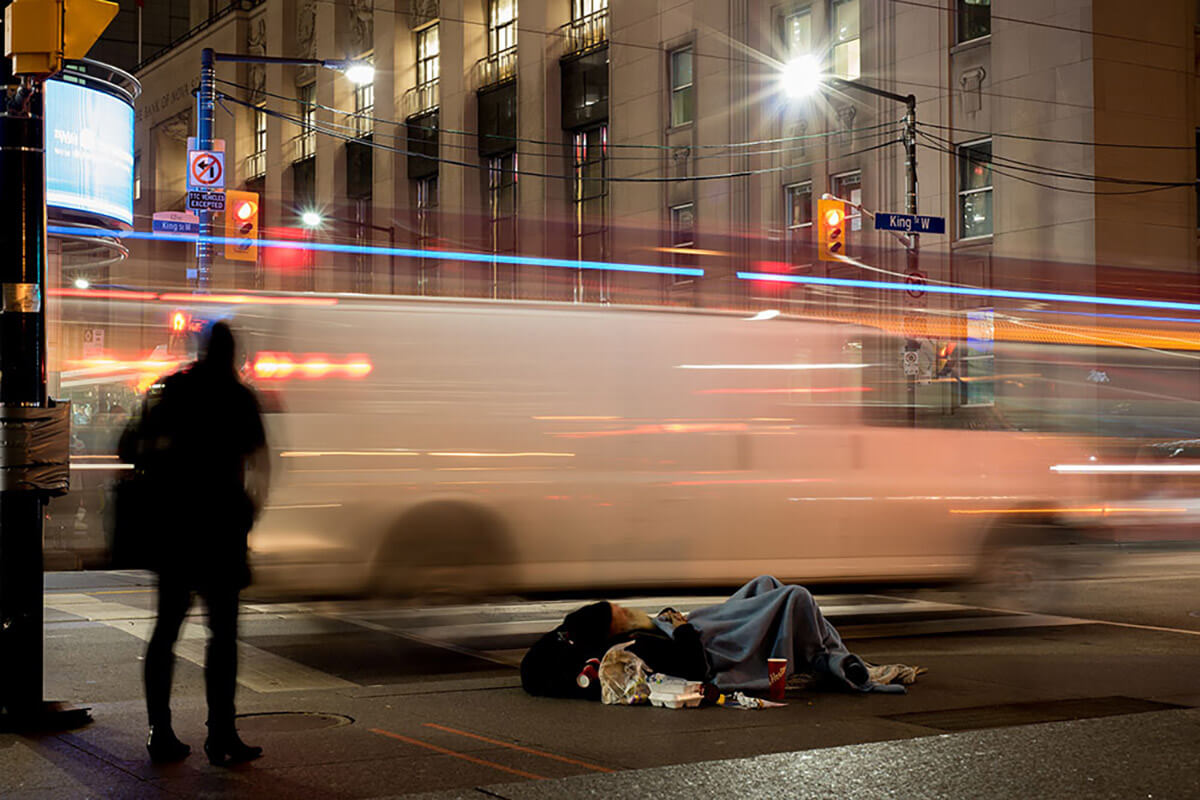Safety Nets
Toronto is experiencing an unprecedented crisis of extreme poverty, which is made visible by the countless numbers of homeless people sprawled across the city’s streets and parks.
This situation highlights, among other things, the importance of social and charity organizations in providing support and assistance to those in need.
Among the various services and resources offered by these organizations are the search for and provision of emergency shelters, transitional housing, and outreach programs to help individuals find stable housing. In addition, they also offer essential services such as food, clothing, medical assistance and mental health support to meet the immediate needs of those who don’t have a place they can really call home – a true safety net for individuals who have fallen through the cracks of society.
Therefore we wanted to find out from the Good Shepherd Ministries, one organization that plays a huge and important role in preventing and combating this social scourge, what the current situation is and what we can all do to help and offer these people the chance to rebuild their lives.
Milénio Stadium: What kind of support does your organization provide to people experiencing homelessness?
Adrienne Urquhart: Good Shepherd Ministries is a front-line charitable organization that has been providing programs and services to homeless and vulnerable individuals since 1963. Programs and services include: overnight shelter for 95 men; daily meal program currently serving 800 meals a day; clothing distribution; medical services with an RN on staff and working in collaboration with other medical professionals and services; Drug and Alcohol Recovery Enrichment Program (DARE) which provides 25 men pre and post detox services and aftercare support; Resettlement program offering housing services to secure and maintain housing; Shelter Diversion program and Follow Up Supports (new programs to assist people before they enter the shelter system and to assist individuals in maintaining their housing); Veterans Housing Navigation which provides case management and one-on-one support for homeless Veterans, also providing life skills groups and working in partnership with Helmets to Hardhats to seek gainful civilian employment with trades; Pastoral Care providing spiritual care to anyone who wishes. In addition, we have two supportive housing residents. One for formerly homeless seniors, age 55 + and one for people living with HIV and AIDS.
MS: In what other ways does Good Shepherd Ministries act to address the growing poverty that is increasingly visible on the streets of Toronto?
AU: Good Shepherd is continually reviewing its programs and services to address the needs of its service users by adding new programs that address emerging concerns. In addition, we realize that case management and one-on-one support is key to ensuring people are successful in achieving their goals and working toward a more stable and secure life.
MS: From your experience and contact with these people, do you realize that many of them choose to live on the streets, not only because of the difficulty in finding shelter, but often because they are afraid of being robbed or assaulted in these same places?
AU: There are a variety of reasons why someone may not wish to stay in a shelter – childhood trauma, psychological reasons etc., however, we find the main reason people are homeless (and the definition of homeless is broad) is the lack of shelter space and affordable housing.
MS: Do you have any kind of support to carry out your activity?
AU: Good Shepherd receives funding from the City of Toronto in the form of a per diem (all shelters receive a per diem/fee for service), as well as multi-level government funding for various programs. We also fundraising a large portion of our revenue through donations, events and other fundraising strategies to support programs that are not funded. We also rely on a large pool of volunteers to assist in carrying out our programs and services.
In May, Toronto’s city council declared the lack of housing for homeless people an “emergency”. As an institution that deals with this reality on a daily basis, how do you look at the situation and the responses that have been given by the various levels of government?
The lack of affordable and deeply affordable housing is a crisis in Toronto. We believe it is the responsibility of all levels of government to come to the table to address this crisis not only in terms of capital but for support dollars to ensure that people who are vulnerable receive the support to assist them in maintaining their housing.
MS: What can be done by the population and community to help reverse this situation?
AU: That is a great question that so far no one seems to want to address cooperatively. Homelessness is not one person’s problem – it is a societal problem that is the responsibility of all of us, including all levels of government. It is a product of a system that has failed to address a growing problem. It is such a large problem that it becomes overwhelming for the individual to see how they can affect change. It may seem trite, but something as simple as educating oneself about the realities of those who are homeless and at-risk, advocating, donating or volunteering have an impact on the day-to-day realities for individuals.
Inês Barbosa/MS









Redes Sociais - Comentários